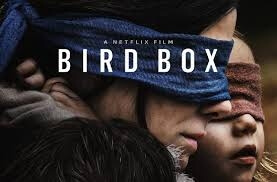The once-wide aesthetic gap between film and television has functionally ceased to exist, and this year we saw a number of TV series shot to look like films, as our own Noel Murray noted last month. But while Hollywood’s obsession with tentpole filmmaking has sent a number of big-name auteurs to TV, it’s still rare to see the opposite: films that look and feel like an abbreviated season of television. Bird Box, Danish director Susanne Bier’s long-in-the-works post-apocalyptic Sandra Bullock vehicle, fits that bill.
The film starts promisingly enough, in an extended sequence where Bullock and Sarah Paulson, cleverly cast as sisters, volley barbed dialogue back and forth on the way to a OB-GYN appointment for the former’s heavily pregnant character, Malorie. Then the mysterious environmental disaster that’s been hovering in the background is suddenly, alarmingly foregrounded, and their drive home becomes a life-or-death obstacle course as random motorists and pedestrians start committing suicide en masse all around them. Apparently, the disaster is being caused by an unnamed, unknowable thing that makes (some) human beings immediately go insane and take their own lives upon seeing it—but not before their eyes (sometimes) turn a spooky shade of CGI purple.
All of this is explained after Malorie is rescued from the chaos on the street and pulled into the craftsman house where she holes up with a small band of survivors, including stoic Iraq-war veteran Tom (Trevante Rhodes), gun-toting MAGA asshole Douglas (John Malkovich), architect/homeowner Greg (BD Wong), naive and very pregnant housewife Olympia (Danielle Macdonald), and nerdy supermarket cashier Charlie (Lil Rel Howery), who conveniently happens to be obsessed with arcane lore applicable to this particular apocalyptic scenario. They’ll spend the next few years in that house, before Malorie is forced to flee with her and Olympia’s children, Boy (Julian Edwards) and Girl (Vivien Lyra Blair), who Malorie refused to name because she’s ambivalent about motherhood—a good indicator of the film’s aversion to subtlety. The group ends up embarking on a perilous river journey that doubles as a heavy-handed metaphor for personal sacrifice, and Bier cuts back and forth between her two timelines in a style reminiscent of episodic TV, complete with markers (“six hours on the river,” “18 hours on the river”) that would make perfect episode breaks.
Bird Box limits its scope but isn’t especially intimate; the ensemble cast is too large to fully develop in a couple of hours, but screenwriter Eric Heisserer tries anyway, writing in one-dimensional character beats and monologues that hint at longer (hourlong, perhaps?) and more satisfying backstories. It’s also high-concept without being particularly imaginative: Bier, best known for family dramas like After The Wedding and the Oscar-winning In A Better World, does little with the theme of blindness that runs through the film, and the massive time jumps similarly imply a more thorough (and more satisfying) exploration of this post-apocalyptic world over, say, 10 hours instead of two. And comparing Bird Box’s uninspired cinematography to TV would actually be an insult to TV at this point; budget is no excuse, as plenty of films with similarly modest price tags—Chloe Zhao’s The Rider comes to mind—boast stunning nature photography.
We never actually see the monster, whose presence is sometimes announced by a gust of wind and sometimes isn’t. It makes some people kill themselves and some people kill others. Sometimes victims die right away and sometimes they don’t. And sometimes the possession is obvious and sometimes it isn’t. The only immutable rule is that birds, presumably by virtue of their unique ocular anatomy, aren’t affected by the monsters, and can sense their presence à la a canary in a coal mine. And so, in this new post-apocalyptic world, Bullock keeps three of them as pets, first in a cage and then in the shabby cardboard box of the title. Perhaps these ideas are developed more effectively in Josh Malerman’s original novel. But given that Heisserer also adapted Arrival, it’s curious that the the script ended up so overstuffed and so shallow all at once.
Bird Box begins its rollout at a disadvantage: Although Malerman’s novel was published in 2014, John Krasinski’s A Quiet Place—whose premise is undeniably similar, except our protagonists must limit sound rather than sight to protect themselves—came out eight months ago. That would be bad enough if this was a thrilling original concept unfairly labeled a rip-off, but Bird Box has another problem: In terms of horror filmmaking, A Quiet Place outdoes it in every conceivable way. There are a few tense scenes scattered throughout—namely, a supermarket raid that also provides some of the film’s more effective laughs—but Bier allows them to slip away before they’ve really registered, failing to sustain the tension the way Krasinski did. In the end, Bird Box’s most significant shortcoming is that it’s just too inert and unfocused to work as sci-fi horror. As a midseason network drama, however, it’d work just fine.

